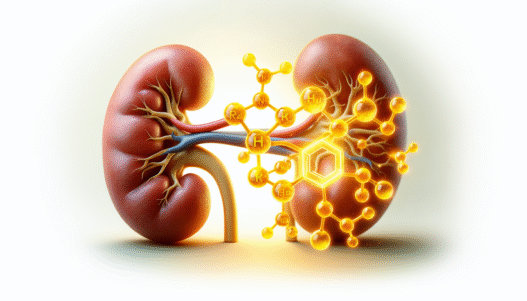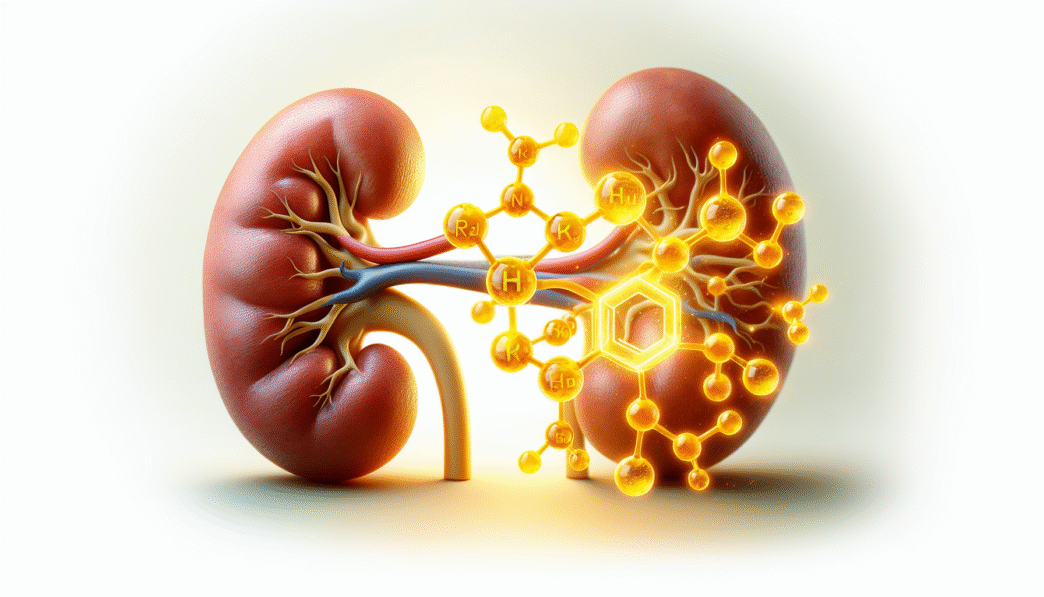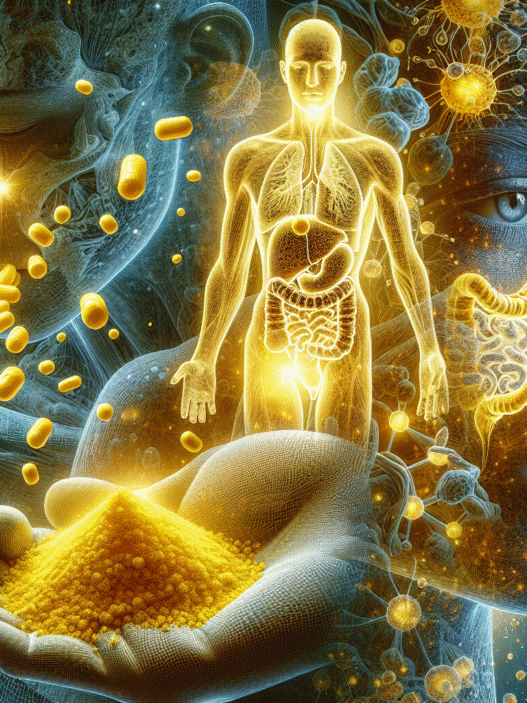Berberine and Kidney Health
Positive Effects on Kidney Function
Recent research highlights the positive impact of berberine on kidney health, particularly for individuals suffering from chronic kidney disease. A 2023 study demonstrated that berberine can substantially improve kidney function by modifying gut microbiota and reducing the production of harmful substances that exacerbate kidney issues (Medical News Today). Specifically, berberine alters the composition of beneficial gut bacteria and inhibits the generation of gut-derived uremic toxins, which are associated with kidney function decline.
The research identified a significant reduction in p-cresol sulfate—an uremic toxin that has been linked to worse outcomes in chronic kidney disease patients. Berberine’s ability to lower the abundance of the gClostridiumsensustricto1 bacteria aids in this reduction, showcasing its potential therapeutic role in managing kidney disease.
Impact on Gut Microbiota
Berberine plays a crucial role in enhancing gut health, which is increasingly recognized for its connection to kidney wellness. By positively altering the gut microbiota, berberine addresses the gut-kidney axis, which refers to the complex relationship between gut health and kidney function. Clinical interventions for chronic kidney disease are often limited, making the modulation of gut microbiota an attractive avenue for treatment.
Table 1 below summarizes the effects of berberine on gut-derived uremic toxins, emphasizing its role in kidney disease management.
| Uremic Toxin | Impact of Berberine |
|---|---|
| p-Cresol Sulfate | Reduced levels in plasma |
| Indoxyl Sulfate | Decreased production, improved outcomes |
High concentrations of these uremic toxins are correlated with adverse prognosis, increasing the risk of both cardiovascular and renal complications. By targeting these harmful toxins, berberine offers a multifaceted approach to promoting kidney health and optimizing overall wellness.
For more insights into the benefits of berberine, including its effects on gut health and its potential in the realm of berberine supplements, explore the related articles.
Berberine and Chronic Diseases
Role in Diabetes Management
Berberine has been recognized for its potential in aiding diabetes management. Clinical trials have demonstrated that berberine’s glucose-lowering effect is comparable to certain anti-diabetic medications. Research indicates that it effectively lowers blood sugar levels and enhances insulin sensitivity, making it a viable option for individuals with type 2 diabetes. Berberine may even be more effective when used in conjunction with blood-sugar-lowering medications.
| Study Type | Findings |
|---|---|
| Clinical Trials | Berberine shows blood sugar reduction comparable to some medications. |
| Combination Therapy | More effective when combined with other diabetes drugs. |
This combination therapy approach leverages the capabilities of berberine and traditional therapies to manage diabetes more effectively. This could be particularly beneficial for those seeking holistic methods to complement conventional treatments.
Effects on Heart Health
In addition to its role in managing diabetes, berberine has potential cardiovascular benefits. Limited research supports that berberine may improve blood lipid profiles and liver enzyme levels. It might help in the reduction of body weight and fat mass in individuals with metabolic disorders.
| Health Metrics | Influence |
|---|---|
| Blood Lipids | Potentially improves lipid levels. |
| Body Weight | May assist in significant weight loss. |
| Liver Enzymes | Claimed to enhance liver health. |
While the available evidence is not extensive, the positive effects of berberine on aspects related to heart health suggest it may be a useful component of a broader health strategy. For a comprehensive understanding of the benefits of berberine, explore the details in our berberine benefits section.
Berberine interacts with various health conditions, making it an intriguing option for those interested in both holistic wellness and preventive care.
Berberine and Metabolic Health
Exploring berberine and kidney function involves examining its broader implications on metabolic health, particularly concerning weight management and cholesterol levels. Research indicates that berberine may offer several benefits in these areas.
Weight Management Benefits
Berberine supplementation may contribute to reductions in key weight markers and may act as an appetite suppressant, leading to decreased food intake. A 2020 review highlighted these potential effects, suggesting that when incorporated into a diet, berberine might aid individuals in their weight management efforts (Medical News Today).
| Effect | Description |
|---|---|
| Appetite Suppression | May reduce food intake, leading to weight loss |
| Weight Markers | Decreases body fat and overall weight |
Cholesterol and Lipid Levels
Berberine also demonstrates potential in improving cholesterol and lipid profiles. According to a 2021 systematic review, this compound may help lower low-density lipoprotein (LDL) cholesterol and triglyceride levels while potentially increasing high-density lipoprotein (HDL), also known as “good” cholesterol. This effect is particularly beneficial for individuals with metabolic disorders.
| Lipid Profile Change | Effect |
|---|---|
| LDL Cholesterol | Decreased |
| Triglycerides | Decreased |
| HDL Cholesterol | Increased |
Moreover, studies have shown that berberine can improve hormonal outcomes in individuals suffering from metabolic conditions such as type 2 diabetes and dyslipidemia, along with lowering C-reactive protein levels, which is a marker of inflammation (Examine).
Additionally, limited research suggests berberine may improve blood lipids and liver enzymes, aiding in the reduction of body weight and fat mass. However, it is important to note that many trials exploring these effects were found to have limitations in methodological quality (Examine).
For those interested in the broader implications of berberine on health, further reading on berberine benefits, berberine supplements, and its role in metabolic health can provide additional insights.
Berberine and Uremic Toxins
The connection between berberine and kidney health extends to its ability to influence the levels of uremic toxins in the body. This section explores how berberine reduces harmful toxins and its implications for kidney disease.
Reduction of Harmful Toxins
Berberine is known to significantly improve chronic kidney disease (CKD) by altering gut microbiota composition and reducing the production of gut-derived uremic toxins. One such toxin is p-cresol, which is linked to worse health outcomes in CKD patients. Studies have shown that berberine lowers the abundance of specific gut bacteria (gClostridiumsensustricto1), resulting in decreased plasma levels of p-cresol sulfate, a harmful compound associated with cardiovascular risks.
| Uremic Toxin | Impact on Health |
|---|---|
| p-Cresol sulfate | Associated with increased cardiovascular and kidney disease risk |
| Indoxyl sulfate | Contributes to endothelial dysfunction and cardiovascular morbidity |
| Trimethylamine N-oxide (TMAO) | Linked to renal injury and tubulointerstitial fibrosis |
Research indicates that addressing these uremic toxins may be crucial in managing kidney disease. Berberine’s role in reducing their levels highlights its potential as a therapeutic option for individuals facing kidney challenges.
Implications for Kidney Disease
The clinical interventions available for chronic kidney disease are often limited, with many patients relying on dialysis for treatment. Given this context, targeting the gut microbiota presents a novel approach for addressing CKD, as alterations in gut health can significantly influence kidney function (PubMed Central). By focusing on the gut-kidney axis, berberine offers a multi-faceted strategy to combat kidney disease.
Furthermore, elevated levels of uremic toxins like indoxyl sulfate have been identified as contributing factors to cardiovascular complications in CKD patients. Indoxyl sulfate is thought to have prooxidant effects that can worsen patient outcomes. Thus, berberine’s ability to modulate these toxins could have significant implications for improving kidney health and overall well-being.
For more insights on the benefits of berberine, consider exploring articles on berberine benefits and its effects on gut health.
Berberine Usage and Interactions
When considering the incorporation of berberine into a wellness routine, it’s vital to understand how it may interact with medications and what potential side effects to watch for.
Potential Medication Interactions
Berberine may significantly interact with various medications, primarily those concerning blood sugar and blood pressure management. Here are some key interactions:
| Medication Type | Interaction Details |
|---|---|
| Diabetes Medications | Berberine may lower blood sugar levels, leading to the risk of hypoglycemia when taken with diabetes medications. Close monitoring of blood sugar levels is advised (WebMD). |
| Blood Pressure Medications | Berberine can lower blood pressure, which may cause blood pressure to dip too low when combined with similar medications. Monitoring is essential (WebMD). |
| Blood Thinners | As berberine may slow blood clotting, combining it with other anticoagulant medications could increase the risk of bruising and bleeding (WebMD). |
| Cyclosporine | Berberine may decrease the metabolism of cyclosporine, potentially leading to increased effects and side effects from this medication (WebMD). |
It is crucial for individuals taking any of these medications to consult with a healthcare provider before starting berberine supplements to avoid potential adverse effects.
Side Effects and Caution
Berberine is generally considered safe for many individuals when used appropriately, but side effects can occur. Some common side effects include:
| Side Effect | Description |
|---|---|
| Gastrointestinal Issues | Some individuals may experience stomach upset, diarrhea, or constipation. Starting with a lower dose may help mitigate these effects. |
| Hypoglycemia | Due to its blood sugar-lowering effects, berberine can cause low blood sugar, particularly when taken alongside diabetes medications. Monitoring is recommended. |
| Allergic Reactions | In rare cases, individuals may experience allergic reactions to berberine, including rash or itching. |
People should exercise caution when using berberine, particularly those with existing health conditions, pregnant or breastfeeding women, and those undergoing surgery or invasive procedures. For more information on the potential benefits and applications of berberine, check our resources on berberine benefits and berberine supplements.
Berberine and Medical Conditions
Potential Effects on PCOS
Berberine has shown promise in improving hormonal balance for individuals with polycystic ovarian syndrome (PCOS). This plant-derived compound may aid in lowering C-reactive protein (CRP), which is a biomarker of inflammation linked to various metabolic conditions, including type 2 diabetes and cardiovascular diseases.
Several studies indicate that berberine’s glucose-lowering effects can be comparable to those of conventional anti-diabetic medications, making it a potential adjunct therapy for managing symptoms and complications associated with PCOS. By improving insulin sensitivity, berberine may also play a role in regulating ovulation and menstrual cycles in women suffering from this condition.
| Effect | Description |
|---|---|
| Hormonal Regulation | May help balance hormones, improving symptoms of PCOS. |
| Inflammation Reduction | Lower levels of CRP could mitigate inflammation-related issues. |
| Glucose Control | Potentially comparable to anti-diabetic medications. |
Impact on Colorectal Cancer
Emerging evidence suggests that berberine may have protective effects against colorectal cancer. Although research is still in its early stages, some studies indicate that berberine could inhibit the growth of cancer cells and induce apoptosis (cell death) in colorectal cancer models. The mechanism might involve the modulation of cell signaling pathways that regulate cancer progression.
Despite these promising findings, more extensive clinical trials are needed to confirm berberine’s efficacy and safety in preventing or treating colorectal cancer. As a holistic health approach continues to gain traction, berberine’s potential anti-cancer properties are noteworthy for individuals interested in cancer prevention strategies.
| Potential Impact | Description |
|---|---|
| Anti-Cancer | May inhibit cancer cell growth and promote apoptosis. |
| Modulation of Pathways | Affects signaling pathways involved in tumor progression. |
For more detailed information on the various benefits of berberine, check out our article on berberine benefits. Awareness of the therapeutic roles of berberine is essential for those looking to integrate it into their wellness regimes, especially regarding conditions like PCOS and colorectal cancer.





















